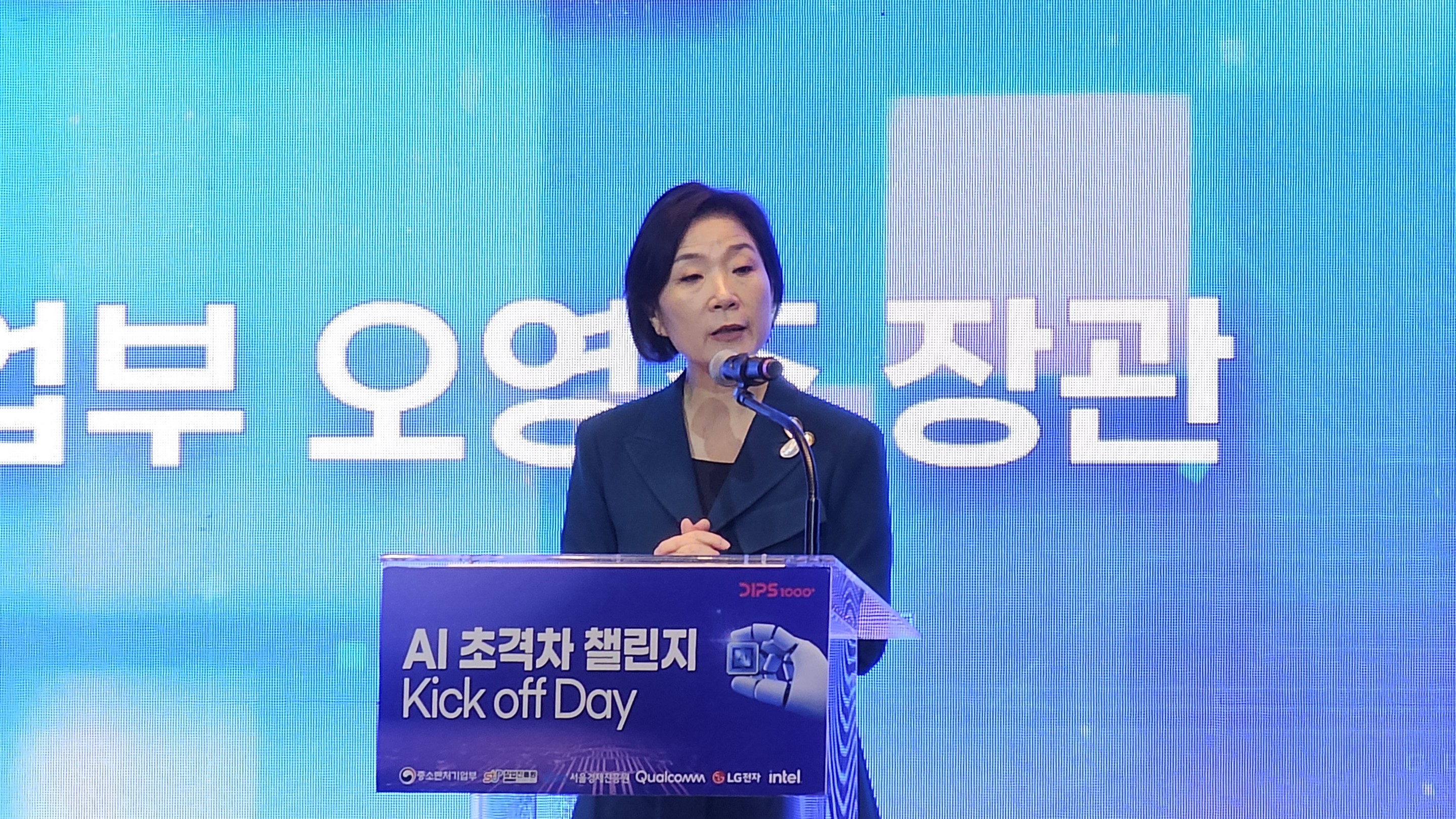AI 시장은 최근 딥시크 쇼크를 비롯해 대기업들도 생태계 협력 모델을 강조하는 등 창의력과 혁신을 창출할 수 있는 바텀업 모델에 대한 추세가 더욱 강하게 나타나고 있다. 이에 정부도 스타트업 육성을 바탕으로 대기업 수요 연결, AI 기술 개발 등을 도모하는 ‘AI 초격차 챌린지’를 확대하고 있다.
.jpg)
▲AI 초격차 챌린지 킥오프 데이
중기부, AI 초격차 챌린지 킥오프 데이 개최
대기업-스타트업 상생 모멘텀, AI 시너지 ↑
LG 및 인텔 이어 퀄컴 합류, 협업 상생 모델
AI 시장은 최근 딥시크 쇼크를 비롯해 대기업들도 생태계 협력 모델을 강조하는 등 창의력과 혁신을 창출할 수 있는 바텀업 모델에 대한 추세가 더욱 강하게 나타나고 있다. 이에 정부도 스타트업 육성을 바탕으로 대기업 수요 연결, AI 기술 개발 등을 도모하는 ‘AI 초격차 챌린지’를 확대하고 있다.
중소벤처기업부가 26일 서울 포시즌스 호텔에서 ‘AI 초격차 챌린지 킥오프 데이’ 행사를 개최했다.
LG전자, 퀄컴, 인텔 등 국내외 글로벌 대기업들과 국내 유망 AI 스타트업 간 수요 기반 협업을 지원하고 기술사업화를 촉진하는 프로그램으로, 이번 행사를 통해 AI 초격차 챌린지 사업이 본격적인 시작을 알린 것이다.
올해는 퀄컴이 신규 협력사로 참여했으며, 챌린지 협업 분야 및 프로그램, 규모 등이 대폭 확대됐다. 올해는 LG전자와 인텔 등이 협업하는 ‘온디바이스 AI’와 퀄컴 및 퀄컴 국내 파트너 유망 딥테크 기업 4개사와 함께 협업하는 ‘버티칼 AI’로 2개 프로그램이 구성돼 있다.
먼저 온디바이스 AI 프로그램은 LG전자 디바이스에 적용 가능한 온디바이스 AI 서비스·기술을 협업하며, △스마트TV △라이프스타일 스크린 △이어폰, 스피커 등 △노트북, 모니터 등 IT 기기 △디지털 사이니지 △스마트 가전 6개 분야로 협업을 확대한다.
여기에 인텔은 개발 툴킷과 AI 칩 활용 교육 등을 지원한다. 협업 수행 결과 성과가 우수한 스타트업에는 개발한 AI 기술을 LG전자 디바이스에 탑재해 매출 확보까지 가능할 것으로 알려졌다.
또한 버티칼 AI 프로그램은 올해 퀄컴이 신설한 프로그램으로 △자율주행 로보틱스 △차량용 AI 카메라 기반 AI 엣지 박스 △인스펙션 드론 △산업용 핸드헬드 기기 4개 분야의 딥테크 기업과의 협업을 지원한다. △인티그리트 △디텍 △아르고스다인 △블루버드 등 4개사가 협업기업으로 알려졌다.

▲오영주 중소벤처기업부 장관
오영주 중소벤처기업부 장관은 “최근 저비용 고성능 딥시크의 등장으로 글로벌 AI 경쟁 구도에 파장을 일으키고 있어 각국 AI 경쟁도 더욱 치열해지고 있다”면서, “이러한 상황은 국내 유망 AI 기업들에게 새로운 기회라고 생각한다”고 말했다.
오 장관은 “국내 스타트업들이 특정 산업과 스마트 기기에 특화된 AI 솔루션 기술을 개발해 차별화된 경쟁력을 보유할 수 있는 중요한 시기”라면서, “온디바이스 AI와 버티칼 AI 챌린지가 새로운 가능성을 여는 디딤돌이 되기를 기대한다”고 밝혔다.
박형세 LG전자 사장은 “AI를 통해 고객에게 더 나은 경험 제공하기 위해 다양한 시도들을 했지만 이러한 혁신은 LG전자 혼자 달성하기란 쉽지 않다”면서, “창의적이고 혁신적인 AI솔루션과 새로운 서비스 모델들이 많이 필요해 스타트업들이 역할을 할 것으로 기대한다”고 덧붙였다.
.jpg)
▲배순민 KT AI Future Lab 연구소장
이날 배순민 KT AI Future Lab 연구소장은 ‘글로벌 AI 기술 동향 발표’를 통해 AI 기술 추세가 ‘에이전틱 AI’로 이동하고 있음을 강조하며 “에이전틱 AI는 시작단계로 투자규모로 볼 때 최근 2년간 성장세가 두드러지며 약 2조원 가까이 투자가 이뤄지고 있다”고 설명했다.
배 연구소장은 “에이전틱 AI, 물리 AI 등으로 진화하기 위해선 데이터가 아직 충분하지 않으며 현실과 디지털 환경 속 수많은 활동들에 대한 데이터를 모으는 것이 매우 중요하다”면서, 이에 기업간 상호보완적 협력과 정부의 다방면적인 생태계 지원 필요성을 피력했다.
.jpg)

.jpg)